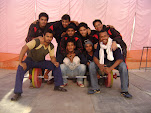Some basic terms you need to know/understand before you workout.
Pump: The best part of working out in a gym- the feeling you get after you've done a nice heavy weight- your muscle feels very tight and strong, feels like blood's rushing through the arteries, your mind feels totally empty, life feels very peaceful, you feel high... Arnold compared this to cumming (if you know what that means) in a very famous video called "PUMPING IRON"
Sets and Reps: Say you did 15 pushups. Then got up, and after 2 min did another 12 pushups, and after 2 min rest again, a final 10 pushups. Then you say you did 3 sets of pushups, 15 reps in first set, 12 reps in second set and 10 reps in the third. Reps are those you do continuously, without any gap. Between sets, you usually take some rest ranging from 1 to 5 minutes.
Volume: Refers to the amount of workout you do, not the weight. If 'A' does 10 reps of 30kg and 'B' does 5 reps of 35kg, A is said to have had more volume in his workout. Usually, bodybuilders have a lot of volume in their workout while powerlifters and weightlifters have relatively low volume.
Intensity: Refers to how much you're doing with respect to the maximum you can do. Say 2 guys, A and B, can both do a maximum of 50kg of bench press for 10 reps. If A is doing 10 reps of 40kg and B is doing 10 reps of 45 kg, B's workout is more intense than A's.
"Bodybuilders usually go for low intensity, high volume workouts. Weightlifters and powerlifters go for very high intensity, low rep workouts" - Many say this, but beginners are advised not to believe this statement.
Failure: 'A' is doing pushups. 20 pushups- a little pain. 30- more pain, but still possible. 35- A can hardly do more pushups. 37- He tries his maximum to get up, but his muscles can't support anymore. That's called failure. Some muscle groups like the abs or the calves are usually worked to failure. Bigger muscle groups like chest, shoulders, legs, back are not.
Plateau: When you start working out, you'll start to feel an increase in strength. You keep following a routine and you progressively keep increasing the load, say 2.5kg per week or two. You can do this till a point but not indefinitely. When you can no longer increase the load, or when your strength stops increasing, you're said to have hit a plateau- No more increase in performance. Hitting a plateau is not really a big deal and it happens to everyone. All you need to do is change your workout routine ( more on this later).
Fatigue, Overload: You go to the gym, do some 3 sets of 25 pushups each. Then some 5 sets of 5 pullups each. Bench press, 4 sets of 10 reps each, with weights you can handle, and then some dumbbell presses and then may be some barbell curls for your biceps and then a lot of crunches and leg raises for your abs and then some other thing- you've 'overloaded' yourself. Refers to having a lot of volume and a lot of exercises with a considerable intensity. Overloading does help when you hit a plateau. When you overload, your body feels completely drained out, that's fatigue.
When you're leaving the gym, you shouldn't feel all drained out and tired. Instead, you should probably be feeling slightly more energitic, not physically, but mentally, since you've got some hormones secreted during your workout. DO NOT WORKOUT IN THE GYM FOR MORE THAN AN HOUR. More time in the gym does not mean more muscle, but actually, if you train too long, you end up losing muscle.
Overreach, Overtrain: Overreach is kind of similar to overloading, except that you have higher intensity and relatively lower volumes. You should be feeling all pumped up after you overreach. Refers to pushing your limits or doing very intense (heavy) workout. Overreaching is very good if you do it once in a week or two and take proper rest after that. A significant improvement in performance can be seen if you overreach on a couple of practice sessions and then take a week off. The week off is for recovery. Recovery period after you overreach may very from days to weeks, depending on your ability to recover.
Overtraining is entirely different from overreaching. Overtraining is a mental and hormonal state. That state when your mind says "Just f**k off dude, I'm not going to the gym" and you keep giving up on weights that u're supposed to do peacefully. Happens when you overload or overreach for a long time and don't allow for recovery. Recovery period for overtraining may be several weeks to months.
Will put my next one soon. Keep visiting.
Subscribe to:
Post Comments (Atom)

No comments:
Post a Comment